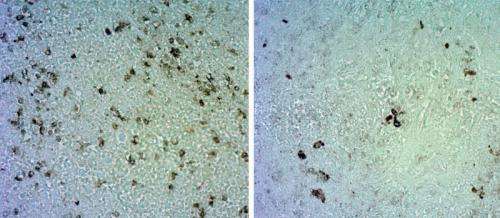Novel monoclonal antibody inhibits tumor growth in breast cancer and angiosarcoma

A monoclonal antibody targeting a protein known as SFPR2 has been shown by researchers at the University of North Carolina to inhibit tumor growth in pre-clinical models of breast cancer and angiosarcoma.
In a paper published in the April 19 issue of Molecular Cancer Therapeutics, a team led by Nancy Klauber-DeMore, MD, professor of surgery and a member of UNC Lineberger Comprehensive Cancer Center, used a monoclonal antibody to target SFRP2 expressed in cells from triple-negative breast cancer and the aggressive blood-vessel malignancy angiosarcoma, reducing the rate of tumor growth. The antibody, created at the University of North Carolina, is the first therapeutic discovered that targets SFRP2.
"We showed in this paper that targeting SFRP2 with a monoclonal antibody in pre-clinical models inhibits tumor growth. This demonstrates that SFRP2 is a therapeutic target for cancer" said Dr. DeMore.
The DeMore lab first discovered the role of SFRP2 in tumor growth while looking to develop an alternative to the FDA-approved anti-angiogenesis drug known as Avastin (bevacizumab). Avastin targets the protein VEGF, which has also been tied to angiogenesis (the production of new blood vessels). Although Avastin is of benefit to some patients with cancer, not all tumors respond to Avastin, and of those that respond, some eventually progress. To find a solution for patients whose tumors are resistant to Avastin, DeMore began looking at other proteins linked to angiogenesis that could be used as therapeutic targets.
"We previously microdissected blood vessels from malignant human breast cancers and compared gene expression to blood vessels microdissected from normal tissue. We found a number of genes that were highly over-expressed in the malignant blood vessels compared to normal. One of those genes was SFRP2," said Dr. DeMore.
The DeMore lab found that SFRP2 is expressed in a variety of human cancers, including breast, prostate, lung, pancreas, ovarian, colon, kidney tumors, and angiosarcomas, DeMore, working with Dr. Cam Patterson, Ernest and Hazel Craige Distinguished Professor of Cardiovascular Medicine, discovered that SFRP2 acted as a potent stimulator of angiogenesis, leading their team to hypothesize that targeting SFRP2 could inhibit tumor growth. In collaboration with Dr. Russ Mumper, the John A. McNeill Distinguished Professor in the Division of Molecular Pharmaceutics, their group developed a drug to target SFRP2. "Demonstrating that a monoclonal antibody to SFRP2 inhibits tumor growth in pre-clinical models opens up a new potential for drug development. This treatment is not presently available for human studies, but our efforts are focused on obtaining funding for further drug development that would lead to a clinical trial" said DeMore.













